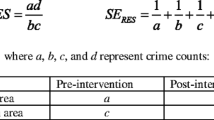Abstract
Criminologists have long been interested in the relationship between policing and community participation. Traditionally, it has been argued that law enforcement agencies are dependent upon the general community for crime information. Recently, however, there is a growing interest among criminologists to explore the dependency relations police create within different subpopulations, especially diverse street subcultures.
This study explores the social organization of police-street hustlers relations. Using qualitative data on 70 hustlers and 50 police officers, we examine how crime is manipulated as a commodity in advancing the interests of informers and the police. It is argued that although separate and unrelated situational factors are important, a more comprehensive understanding of the nature of these exchanges warrants an investigation of social networks and law. It is concluded that the informal contexts of law significantly pervade the informal contexts of these encounters. This topic demands considerable attention given the lack of organizational policies or standards which jeopardizes public confidence and erodes the informer's constitutional protections.
Similar content being viewed by others
References
Bottoms, A. and J. McClean,Defendants in the Criminal Process. London: Routledge and Kegan Paul, 1976.
Box, S.,Power, Crime and Mystification London: Tavistock, 1983.
Ericson, R.:Making Crime: A Study of Detective Work Toronto: Butterworths, 1981.
Ericson R. and P. Baranek,The Ordering of Justice Toronto University of Toronto Press 1982.
Foucault, M.Discipline and Punish New York: Pantheon, 1977.
Foucault, M.Power/Knowledge New York: Pantheon, 1980.
Kuykendall, J. “The Municipal Police Detective: An Historical Analysis”Criminology 24(1), 1986::175–201.
Manning, P.:The Narc's Game Cambridge: M.I.T. Press, 1980.
Marx, G. “Who Really Gets Stung: Some Issues Raised by the New Police Undercover Work”Crime and Delinquency 8, 1982:165–193.
McBarnet, D. “Arrest: The Legal Context of Policing” S. Holdoway (ed.)The British Police London: E. Arnold, 1979.
Miller, G., “Observations of Police Undercover Work”Criminology 25(1), 1987:27–46.
Perry, D. “Assertions of Power: An Examination of Marginal Negotiations Between Police Officers and Citizens”. Unpublished M.A. thesis, York University, 1986.
Rubinstein, J.: “City Police New York: Farrar, Strauss and Giroux, 1973.
Skolnick, J.:Justice Without Trial, New York: Wiley, 1975.
Strauss, A.Negotiations: Varieties, Contexts, Processes and Social Order, San Francisco: Jossey-Bass, 1978.
Turk, A.Political Criminality Beverly Hills: Sage, 1982.
Williams, J. and L. Guess “The Informant: A Narcotics Enforcement Dilemma”Journal of Psychoactive Drugs 13, 1981:235–245.
Author information
Authors and Affiliations
Rights and permissions
About this article
Cite this article
Visano, L. Crime as a negotiated commodity: The police use of informers. The Journal of Human Justice 2, 105–115 (1990). https://doi.org/10.1007/BF02637533
Issue Date:
DOI: https://doi.org/10.1007/BF02637533




